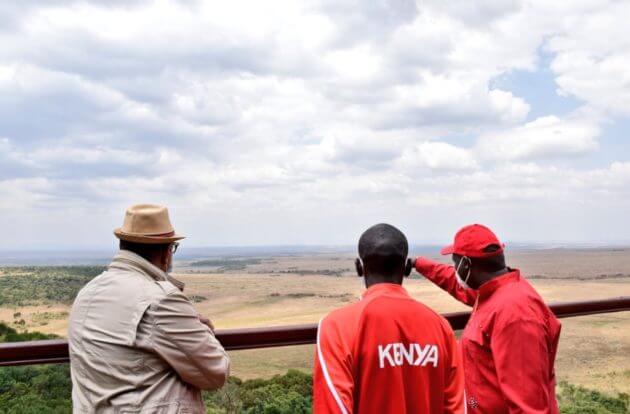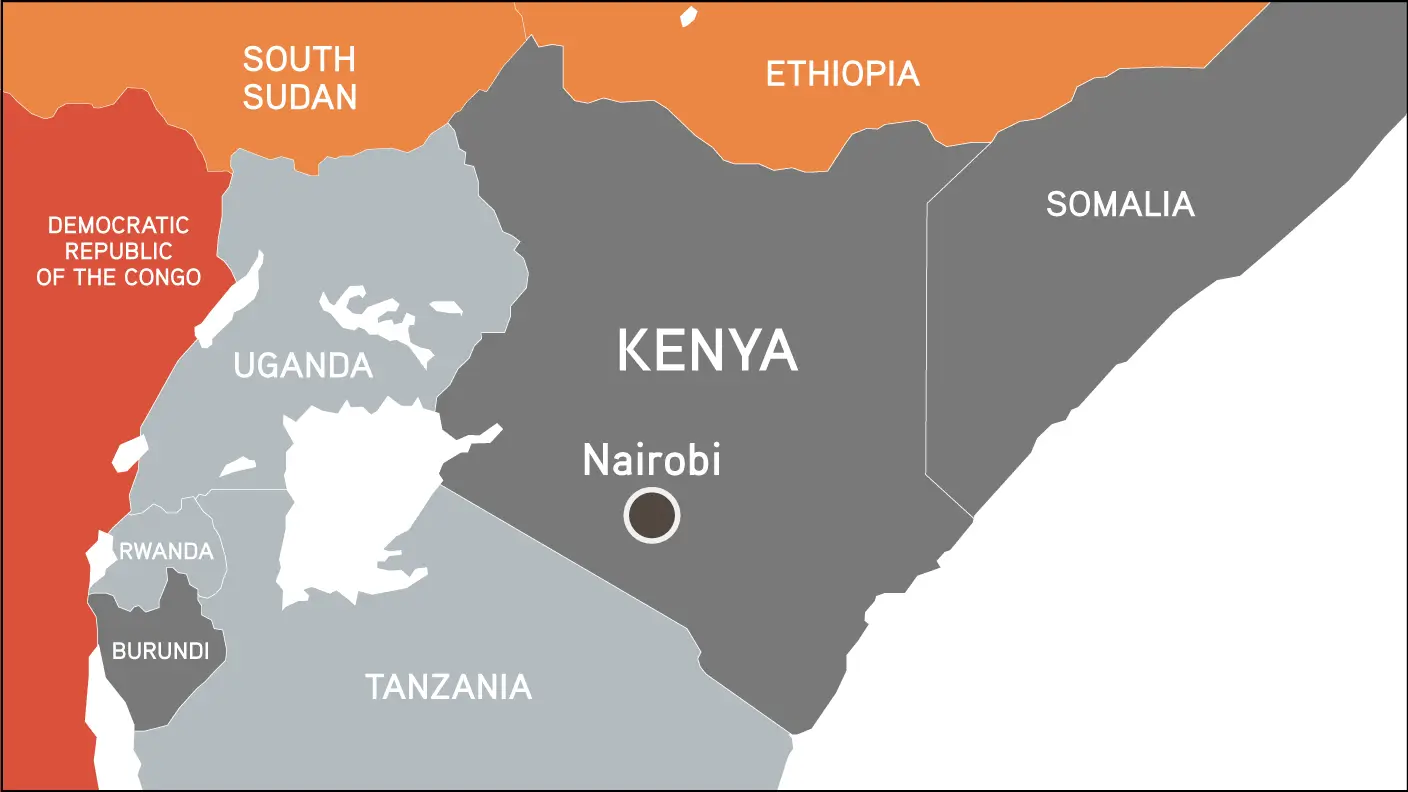The name “Kenya” draws its origin from the renowned Mount Kenya, which held great significance in the region.
Specifically, the name is believed to have been derived from the Kikuyu, Kamba, and Embu names for the majestic mountain: “Kiri-nyaga,” “Kiri-nyaa,” and “Kiinyaa.”
The term “Kenya” is believed to have emerged from a colonial mispronunciation of “Kirinyaga” by the colonialists and early missionaries.
German explorer, Johann Ludwig Krapf, in the 19th century, recorded the earliest written version of the modern name for the nation known as Kenya today.
The “Kirinyaga” Version
The Kikuyu people, residing near present-day Mount Kenya, referred to it as “Kirinyaga” or “Kerenyaga,” signifying the “mountain of whiteness” due to its snow-capped peak.
When the British arrived, they discovered the locals already calling the mountain “Kirinyaga.”
However, struggling with its pronunciation, the British documented it as “Kenia,” which later became the name for the entire British protectorate.
Mount Kirinyaga, being the prominent landmark, became synonymous with the territory claimed by the British as their colony.
The “Kiinyaa” Version
Another version of the name’s origin comes from the Kamba people.
According to this version, while traveling chief Kivoi Mwendwa, a renowned Kamba caravan or long-distance trader, Dr. Krapf spotted the present-day Mt. Kenya’s peak and inquired about its name.
Kivoi responded with “Ki-Nyaa” or “KIima-Kiinyaa,” as the sight of the mountain’s black rock and white snow resembled the male ostrich’s feathers.
However, Krapf misheard the response as “kiinya,” leading to the adoption of the name Kenya.
Over time, the name gained prominence and appeared on maps, travel accounts, and colonial records, even as the region was initially referred to as the British East Africa Protectorate.
Eventually, in 1920, the name was officially changed to Kenya, resonating well with the people.
The true importance of the name Kenya became clear in 1963 when the country became independent.
The people of Kenya chose the name Kenya to celebrate their diverse cultures and bring everyone together.
It became a symbol of their new era of making their own decisions and their shared hopes for the future.
The historical background of Kenya’s name, therefore, weaves together indigenous traditions, European encounters, and the pursuit of independence.
It reflects the resilience and spirit of a nation that embraces its past while eagerly looking ahead to a brighter future.
Kenya’s Meaning in Other Cultures
The name “Kenya” holds various meanings in different cultures and languages.
In Hebrew, for instance, it signifies “animal horn” or “Yes to God,” with “Ken” meaning “yes” and “Ya” representing “God.”
The Masai name for Mount Kenya is “Ol doinyokei,” translating to “striped mountain” in English.
Additionally, in Russian, the name denotes “harmless” or “innocent,” while in ancient English, it conveys the idea of innocence.
Etymology and Linguistic Interpretations
The name Kenya holds intriguing insights into its etymology and linguistic interpretations.
While its precise origin is subject to debate, the name Kenya is often associated with elevated terrains and mountains, reflecting the country’s diverse landscapes.
The name has also been linked to various indigenous languages and cultures, highlighting its deep-rooted connections to the local heritage.
It has metaphorical connotations, symbolizing resilience, unity, and progress, embodying the aspirations of the Kenyan people.
Cultural Significance
Throughout Kenya’s history, the name has been intertwined with pivotal events that have shaped the nation.
From the struggles for independence to the fight against social injustices, the name Kenya has been a rallying cry, symbolizing resilience and the pursuit of a better future.
The cultural significance of the name Kenya goes beyond its linguistic origins.
It embodies the Kenyan people’s spirit, values, and aspirations, reflecting their resilience, unity, and connection to the land.
Whether in ancient traditions, historical events, artistic expressions, or the thriving tourism industry, the name Kenya encapsulates the rich tapestry of a nation proud of its heritage and looks towards a vibrant future.
Modern Interpretations and Global Significance

In the modern era, the name Kenya has acquired new interpretations and global recognition.
Beyond its cultural and historical significance, it holds political and nationalistic connotations that reflect the country’s journey and its place in the world.
As an independent nation, the name Kenya became a symbol of sovereignty and self-determination.
It represented the aspirations of the Kenyan people to govern themselves and shape their own destiny.
On the global stage, the name Kenya has become synonymous with resilience and progress.
The nation’s achievements in various fields, including athletics, conservation, and technology, have elevated its profile internationally.
Kenyan athletes have dominated long-distance running, earning the country numerous accolades and cementing its reputation as a powerhouse in the sports world.
Conservation efforts, particularly in protecting iconic wildlife such as elephants and rhinos, have positioned Kenya as a leader in environmental preservation.
Kenya’s growing technology sector, with mobile banking and information technology innovations, has also garnered global attention and showcased the country’s potential as a hub of innovation and entrepreneurship.
Moreover, Kenya’s diplomatic relations and engagements on the international stage have elevated the name’s significance.
The country actively participates in regional and global forums, advocating for peace, security, and sustainable development.
Final Thoughts
In summary, the name “Kenya” encompasses a rich history rooted in the magnificent Mount Kenya.
While controversies may arise regarding its exact meaning, there is no doubt that the mountain’s name became widely embraced as the pars pro toto name for the country, reflecting its association with the second-highest peak in Africa.
The modern interpretations of the name Kenya reflect its political, nationalistic, and global significance.
It embodies the nation’s journey towards independence, its achievements, cultural diversity, and its contributions on the global stage.
The name has become a symbol of pride, progress, and resilience, resonating with both its citizens and the international community.
So, as we wrap up our exploration of the name Kenya, it becomes evident that this seemingly simple word carries a profound depth of meaning.
From its historical roots to its cultural and global significance, the name Kenya encapsulates the essence of a nation that embraces its past, celebrates its present, and looks toward a promising future.
You may also want to check: What Does “Nairobi” Mean?

